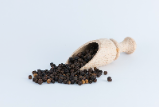Never Give Your Dog These 13 Spices & Seasonings– They’re Toxic!
When you’re deciding whether or not it is safe to feed something to your dog, it’s important to look out for “hidden ingredients.” Spices and seasonings aren’t immediately apparent to the naked eye, so it’s important never to share food with your dog unless you know how it has been seasoned.
A large portion of popular spices and seasoning blends are potentially toxic or harmful to dogs, and if you don’t already know what foods your pup can’t eat, it can be easy to accidentally feed them something you shouldn’t. Luckily, there are several safe seasonings for your dog, and many of the toxic varieties are fairly safe in small quantities.

13 Spices That Are Toxic To Dogs
These are the no-no spices, the ones you should never let your pet eat. If your dog has eaten one of these, particularly a large amount, reach out to your vet and tell them how much your dog has eaten and when; they’ll be able to give you further instructions.
|
Spice |
How Much is Toxic? |
Symptoms of Toxicity |
Toxic Compound(s) |
|
Allspice |
Whole berries or large amounts of powdered allspice. Unlikely to cause toxicity when mixed into baked goods, but still not recommended. |
- Vomiting - Loss of motor function |
Eugenol |
|
Bay Leaf
|
Whole bay leaves or large amounts of powdered bay leaf. Unlikely to be toxic when used in cooked dishes, but still not recommended. |
- Vomiting - Loss of motor function |
Eugenol |
|
Chives
|
0.5% or more of a dog’s body weight. For example, if your dog is 10lbs, toxicosis would become a concern if they consumed more than an ounce of chives. |
- Elevated heart rate - Anemia - Lethargy - Respiratory distress |
Disulfides, Thiosulphates |
|
Cloves
|
Whole cloves, or large amounts of powdered cloves. Unlikely to cause toxicity when mixed into baked goods, but still not recommended. |
- Vomiting - Loss of motor function |
Eugenol |
|
Cocoa Powder
|
0.5 grams (or around 2 tsp) of cocoa powder for every pound of body weight. So if your dog is 10 pounds, toxicity becomes a risk after eating a little more than ⅓ c. cocoa powder. |
- Vomiting - Diarrhea - Extreme thirst - Extreme urination - Respiratory distress - Elevated heart rate - Agitation |
Theobromine |
|
Garlic Powder & Garlic Salt
|
15 grams of garlic per kilogram of body weight. So if your dog is 10 lbs (or 4.5 kg), toxicity becomes a risk after eating around 4 cups of garlic. Unlikely to cause harm when added to cooked dishes, but still not recommended. |
- Elevated heart rate - Anemia - Lethargy - Respiratory distress |
Disulfides, Thiosulphates |
|
Mace
|
2.5 - 4 grams. Unlikely to cause harm when mixed into baked goods, but still not recommended. |
- Vomiting - Loss of motor function - Disorientation - Hallucinations - Gastrointestinal distress |
Eugenol, Myristicin |
|
Marjoram
|
Large amounts of fresh or dry marjoram. While this herb is unlikely to cause toxicity when used sparingly, it’s best to avoid it. |
- Drooling - Lethargy - Vomiting - Diarrhea - Hypothermia |
Linalool, Tannic Acid |
|
Mustard Seed & Mustard Powder
|
Large amounts of whole or ground mustard seed. Unlikely to cause harm when mixed into cooked foods or eaten in very small amounts. |
- Vomiting - Diarrhea - Bloating/gas |
Isothiocyanate |
|
Nutmeg
|
1 tsp. ground nutmeg, or 3 whole nutmegs. |
- Disorientation - Hallucinations - Gastrointestinal distress |
Myristicin |
|
Onion Powder
|
1 tbsp. per 20 lbs. of weight. So if your dog is 10 lbs, toxicity becomes a risk after 1.5 tsp. Unlikely to cause harm when added to cooked dishes, but still not suggested. |
- Elevated heart rate - Anemia - Lethargy - Respiratory distress |
Disulfides, Thiosulfates |
|
Pumpkin Pie Spice
|
Store-bought pumpkin pie spice contains nutmeg and mace, both of which are toxic to dogs. As little as 1 tsp. may be toxic. |
- Disorientation - Hallucinations - Gastrointestinal distress |
Myristicin |
|
Curry Powder
|
Curry powder is a blend of spices including mustard seed, cayenne, chili powder, and other spices that may be toxic or harmful to dogs. A small amount is unlikely to cause serious harm, but it can cause serious stomach issues and even toxicosis. |
- Vomiting - Diarrhea - Bloating/gas - Gastrointestinal distress |
Isothiocyanate, Capsaicin |
Spices That Can Cause Irritation
These spices probably won’t send your dog to the vet, but they can cause serious stomach problems, abdominal pain, vomiting, and diarrhea. Keep your pooch away from these to spare both of you from the mess.
|
Spice |
How Much is Harmful? |
Symptoms of Irritation |
Harmful Compounds |
|
Cayenne
|
Any amount of cayenne can cause oral and gastrointestinal irritation. Cayenne is high in capsaicin and not good to give your dog in any amount. Unlikely to cause physical harm in small amounts. |
- Vomiting - Diarrhea - Gastrointestinal distress |
Capsaicin |
|
Chili Powder/Flakes
|
See Cayenne. |
- Vomiting - Diarrhea - Gastrointestinal distress |
Capsaicin |
|
Paprika
|
See Cayenne. |
- Vomiting - Diarrhea - Gastrointestinal distress |
Capsaicin |
|
Tarragon
|
Moderate amounts of fresh or dry tarragon. Unlikely to cause physical harm in small amounts. |
- Vomiting - Nausea - Agitation - Convulsions/seizures - Elevated heart rate |
Estragole |
Dog-Safe Spices in Moderation
These spices are dog-safe, as long as you feed them to your pooch in moderation! Some even have some health and enrichment benefits, so you can feel good about sharing them with your pup.
|
Spice |
How Much is Safe? |
Why Use Sparingly? |
|
Cinnamon
|
1 tsp or less on occasion. |
Cinnamon in large amounts can cause liver distress, low blood sugar, and gastrointestinal pain. |
|
Parsley (leaves only)
|
1 tsp for every 20 lbs. So if your dog is 10 lbs, their serving of parsley should be ½ tsp or less. |
Parsley contains furanocoumarin, which can be toxic in very large amounts. |
|
Black Pepper
|
Very small amounts in food cooked. |
Pepper is not toxic but offers dogs no benefits and can cause stomach issues. |
|
Salt
|
Very small amounts in cooked food. |
Dogs need salt for cellular function, but their regular diet should already give them enough sodium. |
|
Turmeric
|
⅛ - ¼ tsp for every 10 lbs. So if your dog is 20 lbs, they could have between ¼ and ½ tsp turmeric. |
Tumeric in large amounts can cause vomiting, diarrhea, and nausea. |
Toxic Compounds Found in Spices
Interested in learning more about the compounds found in spices that can make them toxic to dogs? Here’s a quick overview of all the compounds covered in this blog.
Capsaicin
Capsaicin is the active ingredient in chili peppers that makes them spicy and gives you that burning sensation. Difficult for dogs to digest, and highly inflammatory, capsaicin can cause serious vomiting, diarrhea, and gastrointestinal distress. Present in large amounts in peppers, capsaicin can also be found in small quantities in spices like cinnamon, which are safe for dogs in moderation.
Disulfides
Found in the allium family, disulfides break down red blood cells, which can cause life-threatening anemia.
Estragole
Used in very small, carefully measured amounts to flavor pet food, estragole becomes unsafe once it has been consumed in large quantities, and can cause vomiting, diarrhea, and gastrointestinal distress.
Eugenol
Eugenol is a fragrant liquid extracted from essential oils. In a study published in 1950, researchers observed that eugenol could cause severe vomiting, loss of motor function in the limbs, and death at high doses.
Furanocoumarin
Furanocoumarin compounds are used by many plants to repel insects and pests and are toxic to dogs and in some cases, humans. Known to cause cellular damage and inflammation, furanocoumarin poisoning in dogs can cause blindness and serious skin and eye lesions.
Isothiocyanate
Isothiocyanates are another system of defense for many plants that can cause gastrointestinal irritation and can potentially induce toxicosis in dogs.
Linalool
Linalool is a natural essential oil found in fragrant, citrusy plants that acts as an insecticide. Linalool can be used in small amounts as a topical treatment for dogs, but large amounts can be extremely irritating. When ingested, linalool may cause liver damage, and in the worst cases, liver failure.
Myristicin
Myristicin is also a natural insecticide that can cause disorientation, hallucinations, gastrointestinal distress, and even seizures when eaten in large quantities by dogs.
Tannic Acid
Tannic acid is an astringent anti-fungal and antibacterial compound. Large amounts of tannic acid can cause vomiting, diarrhea, and renal failure.
Theobromine
Theobromine is a bitter alkaloid known to be extremely toxic to dogs. Theobromine poisoning symptoms can range from over-excitement and vomiting to serious seizures, heart issues, and death.
Thiosulfates
Used by plants to assist in the nutrient absorption process, thiosulfates can cause anemia in dogs.
Learn more about capsaicin and the foods you should watch out for in our guide to dogs eating peppers!





























